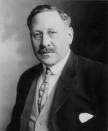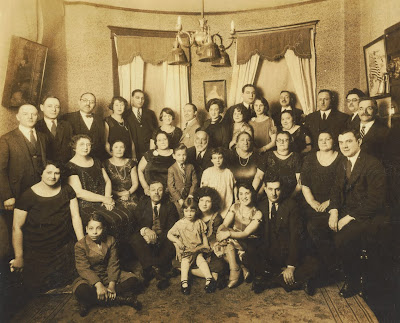The following six-part series is excerpted and adapted from The God and the Ghost: Two Grandfathers, a work in progress.
My father dreams about his father. Dad’s ninety. Poppy’s been dead for thirty-four years.
In these dreams, Dad and Poppy, both adults, have a great, feel-good father-son relationship, man to man, as equals. Things were not, in reality, quite that way. Poppy’s shadow fell over my father like a sheet of lead. A long sheet, too: I’ve spent most of my life wearing it as a suit that felt great to have on but when seen in a mirror with clear eyes was obviously way too big for me. Too big for Dad, too. Poppy was too big for both of us.
One hundred policemen from three North Side stations late yesterday answered a riot call to break up a crowd of several thousand baseball fans that had gathered about a policeman and a prisoner outside the Cubs’ ball park.
The clash began toward the close of the game when pitcher Pete Donohue and other members of the Cincinnati team engaged in an argument with Edward Gertz, 28, of 1436 Pratt Blvd., a manufacturer, who was sitting in a box above the dugout. The players charged Gertz had gone to extremes in reviling them throughout the game. As the last inning was being played the Cincinnati management summoned Policeman G.A. Hunt, who arrested Gertz.
Supporters of Gertz, the officer said, incited the crowd to anger and threats were made to free the prisoner. Hunt then put in the riot call and the reserves dispersed the crowd with difficulty. Taken to the Town Hall station, Gertz was charged with disorderly conduct. He was later released.”
July 6. 1927.
The reporters were being polite. “Manufacturer” was a misnomer off by a mile and “hostilities” an understatement. He was 6’4”, 240lbs – rare stature in his era – with an intimidating physique and glare that could scare the stripes off a tiger. But though he looked like one and was in the liquor business in Chicago during Prohibition, he wasn’t a mobster.
He was the god of my youth.
On Sundays, when they lived in New York, we would go to Manhattan from our home in Queens to visit Grandma and Poppy. They lived in an apartment at 240 Central Park South that seemed larger than it actually was and modestly swank. Poppy drove a Cadillac, Grandma wore mink. It seemed he was the King of New York. Long lines at restaurants? Ignored. No reservations, no problem. Poppy would steer us to the front door, the doorman would breeze us in, the maitre’d would give him a warm greeting – “Mr. Gertz, so good to see you, right this way” – and we’d be immediately seated.
He was a regular at Lindy’s, the renowned Broadway restaurant immortalized in Damon Runyon stories as Mindy’s, where show business personalities, the sports crowd, gamblers, underworld types and solid citizens congregated over lox and bagels; we got the red carpet routine when we’d go there. He and Leo “Lindy” Lindermann were pals. He was friends with Lou Walters, owner of New York’s famed nightclub, the Latin Quarter, and father to Barbara; with Jules Podell, owner of the Copacabana; with Toots Shor, who’s eatery was where the elite of show business and the sports world hung out (though he thought Toots a loud-mouth). Ex-champ Jack Dempsey’s restaurant on Broadway was a second home; they were old friends from way back.
No matter where we went, Poppy was treated as a potentate with deference shown by all. His friends, countless; he knew everybody, it seemed: the sunny, the shady and the dark, trading smiles and firm handshakes. He was never awestruck by celebrities; if anything, it was the other way around. Heads turning when we’d walk down the street and whispers were a matter of course. People naturally assumed he was a big shot of some sort. When he walked into a room, all eyes fixed upon him; he possessed a personal force that was palpable.
He was a gentleman of the old school, courtly and polite. He always gave my sister and me expensive gifts; we had carte-blanche at F.A.O. Schwartz. He’d have bought us the world if we asked. I’d watch him shave in the morning; his whiskers were tough, like him. He took my side when my father was angry with me. “Everything copacetic? he’d ask. I’d make what passed for a clever remark and he’d exclaim to all, “the kid’s a pistol!” with earnest pride. The words warmed me; I was okay in his book. His scent of cigars fused with Aqua Velva after-shave remains with me, as do the size and thickness of his fingers: I’d slip his massive diamond-studded Masonic ring on my thumb and have room for another thumb and a pinkie, too. Hell, I could have slipped the ring onto my wrist. He would tease me with displays of mock toughness: towering over me in fighting stance, his fists the size of cannon shot, his eyes narrowed, he’d feint punches, mock-menace growl, make me hesitate before I’d laugh, then he’d widen his eyes, open himself and corral me into a hug that stayed with me for hours afterward. He inspired awe in strangers. He certainly inspired awe in me.
Though it means nothing in the grand scheme of things and even less to my cousins, I am the son of the son of the first son of the first son of Aaron Gershowetz, horse-trader, born 1826 in Vilna, Lithuania, land of Litvaks and giant, bohunk Jew-boys. First-born, Morris, (b.1865), at the behest of Aaron, sold horses to the Russian army, took the money and ran, landed in England, met Grace Grossman, Galitzianer, married her, and in 1896 journeyed to Chicago where they settled on Halsted Street in the 20th Ward on the Near West Side.
The “Bloody 20th” was a feral slum where poor immigrant Italians and poor immigrant Irish and poor immigrant Poles clashed with one other but most of all battled with the poverty-stricken Russian Jews who were flooding into the squalid area crowded with fire-trap rickety wood houses built on top of one another, airless brick tenements, streets teeming with pushcarts, horse manure, sweatshops, rag dealers, junk dealers, small merchants and tradesmen, vice, crime, vivid life and desperate humanity. There goes the neighborhood, a patchwork of highly segregated ethnic enclaves locked in a Darwinian dynamic. Mayberry it wasn’t: It was known as “the Darkest Corner of Chicago.” The family residence, at 383 S. Halsted, was just a few blocks down the street from Jane Adams’ Hull House.

He was born Milton Gershowetz, the first of Morris-anglicized-Maurice’s and Grace’s six children, in 1899. Known in the family throughout his childhood as Edmilt, he appears to have exited the womb at full, mammoth size; there are no pictures of him as a little boy. The Edmilt handle went fast. He changed his name to Edward M. In late adolescence, he changed surnames. He was first-generation American, not a Litvak. So Maurice, who’d imported his younger brother and five sisters – the instantly anglicized-upon-landing Marvin, Fanny, Mary, Esther, Bessie, Sarah and Annie – followed suit. And then the entire family. The Gershowetz’s of Lithuania became the Gertz’s of Chicago, a name a little more American with a little more class – Maurice Gershowetz became Maurice Gertz, Fine (impoverished) Tailor – and a little less ethnic with a little less baggage. But not much. (A Gershowetz for ninety-one years by the time he arrived in 1917, Aaron saw no point in becoming Gertz).
 Ed attended junior college, studying to become an engineer. To help with the bills he got a job working as chauffeur and bodyguard for Julius Rosenwald, the German-American Jew who turned Sears, Roebuck’s nice mail-order business into a retailing behemoth. That Rosenwald required the services of a bodyguard tells us something about how difficult it was for Jews, despite their wealth (or because of it), to get on with their lives in Chicago in those years. No doubt Rosenwald had been tipped to Ed’s engaging personality, ambition, and physical reputation. Only 19, he was an up and comer, a Jewish kid to keep an eye on.
Ed attended junior college, studying to become an engineer. To help with the bills he got a job working as chauffeur and bodyguard for Julius Rosenwald, the German-American Jew who turned Sears, Roebuck’s nice mail-order business into a retailing behemoth. That Rosenwald required the services of a bodyguard tells us something about how difficult it was for Jews, despite their wealth (or because of it), to get on with their lives in Chicago in those years. No doubt Rosenwald had been tipped to Ed’s engaging personality, ambition, and physical reputation. Only 19, he was an up and comer, a Jewish kid to keep an eye on.

